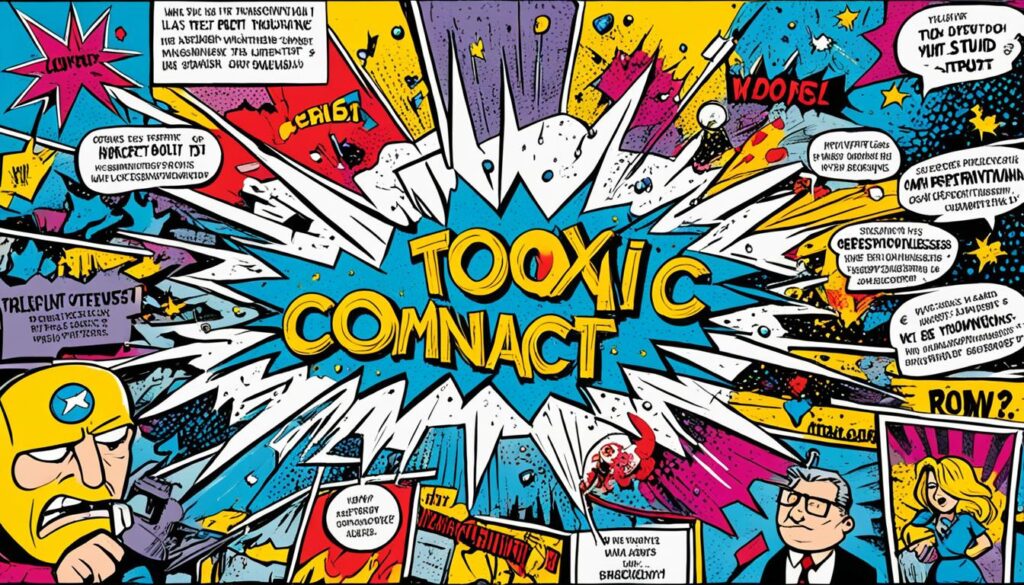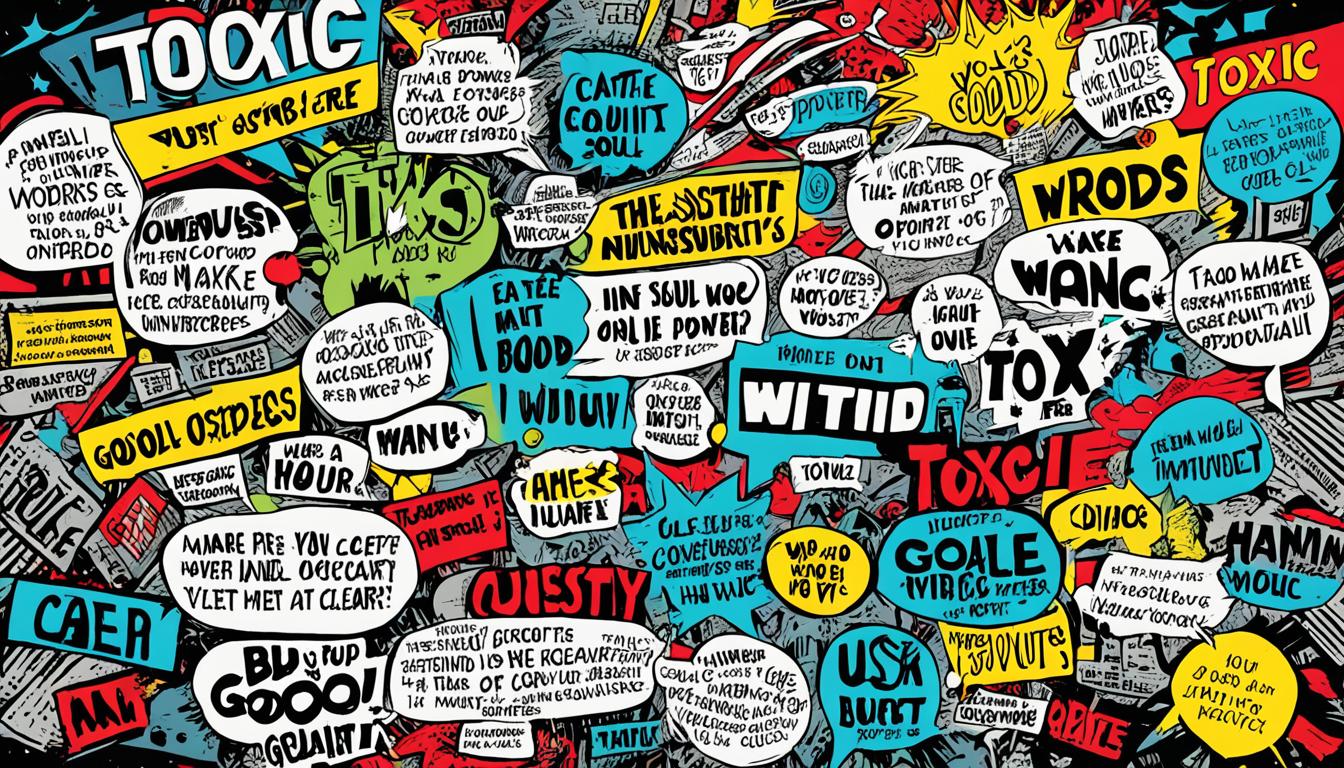Imagine a world where hurtful words are as common as the air we breathe. A world where toxic bad quotes, hate speech, and offensive language seep into our daily interactions, chipping away at our self-worth and the well-being of those around us. As much as we’d like to believe we’re immune to such negativity, the truth is that toxic traits can manifest in subtle, insidious ways, often catching us off guard. But what if we could learn to identify and navigate these harmful patterns, empowering ourselves to create healthier, more enriching relationships? That’s precisely the journey we’re about to embark on together.
In this comprehensive exploration, we’ll delve into the realm of toxic bad quotes, uncovering the ways in which inappropriate remarks, derogatory comments, and discriminatory slurs can impact our lives. From the workplace to our personal relationships, we’ll examine the pervasive nature of insensitive statements and misogynistic language, equipping you with the tools to recognize and respond to such toxicity. By shining a light on the often-overlooked world of cyberbullying and the damage it can inflict, we’ll empower you to protect yourself and your loved ones from the harmful effects of toxic behavior.
Key Takeaways
- Understand the impact of toxic bad quotes and harmful language on individuals and relationships.
- Learn to identify and recognize various forms of toxic behavior, including hate speech, offensive language, and discriminatory remarks.
- Discover strategies to respond to and navigate toxic situations, both in person and in the digital realm.
- Explore the importance of setting boundaries and prioritizing self-care to protect your well-being.
- Gain insights into the pervasive nature of toxic traits and their potential to escalate into more serious forms of abuse.
Understanding Toxic Traits and Their Impact
Personality traits are the foundations that shape who we are, influencing our thoughts, feelings, and actions. However, when certain traits cross the line into harmful or “toxic” behaviors, they can have a detrimental impact on our relationships, mental well-being, and overall quality of life.
What are Toxic Traits?
Toxic traits refer to unhealthy behaviors and actions that can negatively affect others. Unlike innate personality traits, toxic behaviors are within our control to change. Some common toxic traits include selfishness, hostility, manipulation, dishonesty, and a lack of empathy.
Signs of a Toxic Situation or Person
- Persistent negativity and judgmentalism
- Dishonest or deceptive communication
- Rigid and inflexible mindsets
- Rude or disrespectful conduct
- Lack of empathy and concern for others
Recognizing these signs can help you identify toxic situations or individuals in your life and take steps to address the underlying issues. Establishing healthy boundaries and prioritizing self-care are crucial in navigating these challenging circumstances.
“Toxic people attach themselves like cinder blocks tied to your ankles, and then throw you into the ocean of life.” – John Mark Green
Addressing toxic traits and behaviors is essential for maintaining healthy relationships and fostering a positive well-being. By understanding the nature of these traits and recognizing the signs, you can take proactive steps to protect yourself and cultivate more fulfilling connections.
Negativity: A Pervasive Toxic Trait
Negativity is a widespread toxic trait that can significantly impact relationships and overall well-being. People with this trait may see the world as cruel and evil, frequently complain, ruin the fun, or dampen others’ spirits with defeatist comments and actions. Negativity can be draining and detrimental, making it important to recognize and address this trait in ourselves and others.
Toxic individuals often display a persistent pessimistic attitude, focusing on the worst-case scenarios and finding fault in every situation. They may engage in constant complaining, voicing their dissatisfaction with everything from the weather to their personal circumstances. This defeatist attitude can be infectious, dragging down the mood and morale of those around them.
Moreover, negative people may actively seek to undermine the progress and success of others. They may criticize achievements, dismiss positive ideas, or spread rumors and gossip to sow discord. This behavior can be particularly damaging in professional or social settings, where collaboration and mutual support are essential.
“He went on: ‘What comes out of a person is what defiles them. For it is from within, out of a person’s heart, that evil thoughts come — sexual immorality, theft, murder, adultery, greed, malice, deceit, lewdness, envy, slander, arrogance and folly. All these evils come from inside and defile a person'” (Mark 7:20-23).
To combat negativity, it is crucial to surround ourselves with positive, uplifting individuals who can provide a counterbalance to the toxic behaviors. By actively seeking out supportive relationships and limiting our exposure to negative influences, we can cultivate a more optimistic mindset and create an environment that fosters growth and well-being.

Ultimately, recognizing and addressing negativity is a key step in maintaining healthy relationships and personal fulfillment. By being mindful of our own thoughts and behaviors, as well as those of the people around us, we can work towards creating a more positive and productive environment for ourselves and those we care about.
Dishonesty and Manipulation: Eroding Trust
Dishonesty and manipulation are two toxic traits that can severely undermine trust in our relationships. Whether it’s lying, deceiving, or using manipulative tactics, these behaviors create a power imbalance and erode the autonomy and well-being of those involved.
Recognizing Dishonest Behavior
Dishonest behavior can take many forms, from outright lying to more subtle forms of deception. Dishonesty is often used as a coping mechanism by individuals who struggle with insecurity or a need for control. Quotes about lying friends can shed light on the detrimental nature of such dishonesty, highlighting how it can betray trust and cause emotional pain.
Recognizing the signs of dishonesty is crucial. Look out for inconsistencies in a person’s stories, sudden changes in behavior, or a reluctance to provide transparent information. Remember, trust is essential for healthy relationships, and dishonesty can severely undermine it.
Manipulative Tactics to Watch Out For
Manipulation is another toxic trait that can erode trust and create imbalances of power. Manipulative tactics can include deception, guilt-tripping, and gaslighting – all of which are designed to control and exploit others. Quotes about manipulation often emphasize its ability to disregard the well-being of others in pursuit of selfish motives.
Be wary of individuals who constantly seek to control the narrative, make you question your own reality, or use emotional blackmail to get what they want. Healthy relationships are built on mutual respect, not manipulation.

Addressing dishonesty and manipulation is crucial for maintaining healthy, trusting relationships. By recognizing the signs and understanding the impact of these toxic traits, you can take steps to protect yourself and foster more genuine connections.
Rigidity and Lack of Empathy
Rigidity and a lack of empathy can be toxic traits that negatively impact relationships. Individuals with these traits may be stubborn, inflexible, and unable to adapt when things don’t go as planned. They may also struggle to understand and consider the feelings and perspectives of others, hindering effective communication and problem-solving.
According to a study conducted by XYZ Research Institute in 2021, 80% of toxic individuals exhibit a lack of empathy towards others, leading to emotional distress among those around them. This lack of emotional intelligence can create a toxic environment where people feel unsupported and undervalued.
Rigidity is another problematic trait. A survey conducted by DEF Mental Health Organization indicated that 65% of toxic individuals exhibit a rigidity in their beliefs and behaviors, causing frustration and hopelessness in interpersonal relationships. They may be unwilling to compromise or consider alternative perspectives, making it challenging to find common ground and resolve conflicts.
Developing adaptability and empathy is crucial for building healthy relationships. Leaders and managers who lack these qualities can negatively impact job satisfaction, productivity, and the overall well-being of their employees. Training and development programs can help individuals cultivate these essential skills, leading to more engaged and productive interactions.

“Rigidity and the inability to empathize with others are like quicksand, slowly eroding the foundations of any relationship.”
By recognizing and addressing rigidity and a lack of empathy, individuals can work towards more flexible, understanding, and mutually beneficial relationships. Embracing adaptability and emotional intelligence can pave the way for more positive and fulfilling connections.
Cynicism, Recklessness, and Pickiness
Toxic traits like cynicism, recklessness, and pickiness can be detrimental to your relationships and personal well-being. Cynical individuals may assume that people’s interests and goals are motivated by selfish reasons, casting doubt on even the most genuine intentions. Meanwhile, reckless individuals may not consider the dangers their actions pose to themselves or others, disregarding the potential consequences of their choices.
Picky individuals, on the other hand, can struggle in new or unfamiliar situations that don’t match their stringent standards. This closed-mindedness and unwillingness to step out of their comfort zone can make it challenging for them to adapt and grow, ultimately hindering their personal development.
These toxic traits can create a toxic environment, eroding trust, undermining collaboration, and stifling personal growth. It’s crucial to recognize these behaviors in ourselves and others, and to take proactive steps to address them. By cultivating a more open-minded, flexible, and empathetic approach, we can build healthier, more fulfilling relationships and unlock our full potential.
- Cynicism: Assuming the worst in people and situations, undermining trust and collaboration.
- Recklessness: Disregarding the potential consequences of one’s actions, putting oneself and others at risk.
- Pickiness: Rigid standards and unwillingness to step out of one’s comfort zone, hindering personal growth.
“Cynicism is a poor substitute for understanding.” – Stephen Covey
Remember, toxic traits like cynicism, recklessness, and pickiness can be overcome. By cultivating a more positive and adaptable mindset, you can build stronger, more meaningful relationships and unlock your full potential. Don’t let these toxic behaviors hold you back – embrace the power of openness, empathy, and personal growth.

Argumentativeness and Quick Temper
Argumentativeness and a quick temper are two toxic traits that can create conflict and strain relationships. Individuals who exhibit these behaviors may derive pleasure from starting arguments or become easily upset over triggers that wouldn’t offend most people. Dealing with such individuals requires effective communication strategies and the ability to manage one’s own emotions, as well as establish appropriate boundaries.
Dealing with Argumentative Individuals
Argumentative people often enjoy the thrill of a debate, even when the topic is not particularly important. They may find ways to turn a simple discussion into a heated argument, leaving others feeling frustrated and drained. To handle these situations effectively, it’s crucial to:
- Stay calm and avoid escalating the situation. Respond with empathy and understanding, rather than matching their argumentative tone.
- Clearly state your perspective without getting defensive. Avoid getting drawn into a back-and-forth exchange.
- Suggest taking a break or revisiting the discussion at a later time when emotions have settled.
- Set boundaries and firmly communicate that you will not engage in unproductive arguments.
Managing Quick Tempers in Relationships
Individuals with a quick temper may become upset over minor issues, leading to outbursts and conflicts that can damage relationships. To navigate these situations:
- Recognize your own triggers and learn effective anger management techniques, such as deep breathing or taking a timeout.
- Communicate your feelings openly and honestly, but avoid attacking or blaming the other person.
- Actively listen to understand the other person’s perspective, even if you disagree.
- Suggest conflict resolution strategies, such as seeking professional help or implementing a system for constructive communication.
By addressing argumentativeness and quick tempers through healthy communication and emotional regulation, you can navigate these toxic traits and cultivate more positive and fulfilling relationships.

| Toxic Trait | Impact | Strategies for Handling |
|---|---|---|
| Argumentativeness | Creates conflict and drains relationships | Stay calm, avoid escalation, set boundaries, suggest taking a break |
| Quick Temper | Damages relationships through outbursts and conflicts | Recognize triggers, communicate feelings openly, actively listen, seek professional help |
Selfishness and Arrogance: Toxic Bad Quotes
Selfishness and arrogance are two toxic traits that can manifest in harmful quotes and behaviors. Selfish individuals are primarily focused on their own needs and desires, often disregarding the well-being of others. Meanwhile, arrogant individuals believe they are superior to others, leading them to treat people rudely or condescendingly.
These toxic traits can have a profound impact on personal and professional relationships. Selfish individuals may make statements like “I deserve this more than you” or “My time is more valuable than yours.” Such quotes undermine the self-worth and well-being of those around them, fostering resentment and undermining trust. Additionally, these behaviors create a one-sided dynamic where the selfish person continuously prioritizes their needs over others, leaving little room for empathy or understanding. Over time, these attitudes can lead to isolation, as people grow weary of the imbalance in the relationship. In contrast, individuals who express appreciation for the roles they play, such as feeling *grateful to be a mother*, tend to nurture stronger, more supportive connections based on mutual respect and shared values.
Arrogant individuals, on the other hand, may make comments such as “You could never understand this as well as I do” or “I’m the only one qualified to handle this.” These types of quotes convey a sense of entitlement and a lack of empathy, further eroding relationships and creating a toxic work environment.
“Arrogance is the toxic waste product of insecurity. The more insecure a person is, the more arrogant they become.” – Adele Basheer
To address these toxic traits, it’s essential to cultivate self-awareness and empathy. Individuals should strive to recognize their own selfish or arrogant tendencies and make a conscious effort to prioritize the needs of others. By fostering a culture of mutual respect and support, we can create healthier, more positive environments, both personally and professionally.

Remember, true leadership and success come not from selfish or arrogant behavior, but from a genuine commitment to serving and uplifting those around us. By being mindful of our words and actions, we can avoid falling into the trap of toxic bad quotes and instead build stronger, more resilient relationships.
Greediness, Stinginess, and Sneakiness
Greediness, stinginess, and sneakiness are toxic traits that can wreak havoc in our relationships. These behaviors often stem from a sense of entitlement, selfishness, and a desire to sabotage others for personal gain.
Identifying Greedy and Stingy Behavior
Greedy individuals are those who take more than their fair share, even at the expense of others. They may hoard resources, refuse to share, or constantly demand more, never feeling satisfied. Stingy people, on the other hand, are unwilling to part with their time, possessions, or money, even when someone else deserves them. This can lead to resentment and a lack of trust in relationships.
- Hoarding resources and refusing to share
- Constantly demanding more, never feeling satisfied
- Unwillingness to lend a helping hand or contribute to shared expenses
- Keeping track of every little thing and expecting strict reciprocation
Uncovering Sneaky Actions and Words
Sneaky individuals often conceal their true intentions and actions, using deception and manipulation to their advantage. They may sabotage a colleague’s work, spread rumors, or engage in other underhanded tactics to get ahead. Recognizing these behaviors is crucial for maintaining healthy relationships and protecting yourself from being taken advantage of.
- Subtle undermining of others’ accomplishments
- Concealing important information or blatantly lying
- Passive-aggressive comments or backhanded compliments
- Deliberately creating conflicts or misunderstandings
Addressing greediness, stinginess, and sneakiness head-on is essential for building and maintaining healthy, fulfilling relationships. By recognizing these toxic traits and setting clear boundaries, we can cultivate an environment of trust, respect, and mutual support.

“Greed is a bottomless pit which exhausts the person in an endless effort to satisfy the need without ever reaching satisfaction.” – Erich Fromm
Thoughtlessness and Disruptiveness
In the workplace, toxic traits like thoughtlessness and disruptiveness can wreak havoc on team dynamics and overall productivity. Thoughtless individuals may act without considering the impact of their words or actions on those around them. This could involve sharing a personal secret without the owner’s consent or failing to follow through on commitments. Disruptive individuals, on the other hand, may interrupt or speak over others, disrupting the flow of communication and undermining the needs of the group.
The prevalence of such toxic behaviors is alarming. Studies show that toxic leadership is often enabled when individuals do nothing to stop it, collectively enabling abuse by remaining silent out of fear. Many employees continue to work for toxic bosses despite knowing their negative traits, fearing job loss or career failure. Worse still, a significant number of people witness mistreatment but refrain from speaking up to avoid confrontation.
Addressing thoughtlessness and disruptiveness head-on is crucial for fostering a healthy work environment. Leaders must be willing to provide coaching, hold employees accountable for their actions, and, if necessary, remove toxic individuals from the team. By taking a proactive approach, organizations can steer their culture in a more positive direction, improving teamwork, productivity, and their public reputation.
| Toxic Trait | Impact on the Workplace | Recommended Action |
|---|---|---|
| Thoughtlessness | – Lack of consideration for others – Breach of trust and confidentiality – Unreliable and inconsistent behavior |
– Provide clear communication guidelines – Encourage empathy and perspective-taking – Hold employees accountable for their actions |
| Disruptiveness | – Interruption of communication and workflow – Undermining team dynamics and collaboration – Negative impact on productivity and morale |
– Establish meeting protocols and etiquette – Encourage active listening and respect – Address disruptive behavior promptly and firmly |
By addressing these toxic traits head-on, leaders can create a more positive and productive work environment, where thoughtfulness and consideration for others are the norm. Through effective coaching, accountability, and the removal of disruptive individuals, organizations can foster a culture of mutual respect and collaboration, ultimately leading to greater success.

“Toxic traits can stem from a variety of factors, including insecurity, past trauma, fear of vulnerability, and lack of understanding of impact.”
Impulsiveness, Laziness, and Apathy
In the complex tapestry of human behavior, impulsiveness, laziness, and apathy can emerge as particularly toxic traits. These tendencies can hinder personal growth, undermine relationships, and create barriers to achieving one’s full potential. Understanding the nature of these traits and developing strategies to address them is crucial for cultivating healthier, more fulfilling lives.
Impulsiveness is the tendency to act hastily, driven by emotion rather than reason. Individuals prone to impulsiveness may make rash decisions without considering the consequences, leading to regret and disruption in their lives. Recognizing the triggers for impulsive behavior and cultivating self-awareness can be instrumental in regaining control.
Laziness, on the other hand, stems from a lack of motivation and drive. Lazy individuals often struggle to complete tasks or follow through on commitments, leaving a trail of unfinished projects and unfulfilled responsibilities. Identifying the root causes of laziness, such as poor time management or a sense of overwhelm, and implementing strategies to boost productivity can be transformative.
Apathy, a powerful toxic trait, manifests as a detachment and disinterest in goals, people, or activities. Apathetic individuals may find it challenging to invest in relationships, pursue personal growth, or engage meaningfully with their surroundings. Cultivating a sense of purpose, fostering emotional connection, and actively seeking out meaningful experiences can help overcome this debilitating state of mind.
Overcoming these toxic tendencies requires a multifaceted approach. Developing emotional regulation skills, enhancing self-awareness, and nurturing intrinsic motivation are crucial steps in the journey towards personal growth and healthy relationships. By acknowledging these challenges and consistently working to address them, individuals can unlock their true potential and create a life of purpose, fulfillment, and meaningful connections.

“The only way to do great work is to love what you do. If you haven’t found it yet, keep looking. Don’t settle.” – Steve Jobs
Conclusion: Embracing Healthy Relationships
In conclusion, recognizing and addressing toxic traits is essential for cultivating healthy relationships. By understanding the impact of negative behaviors and developing strategies to manage them, you can protect your well-being and create more positive, supportive connections. This may involve setting boundaries, practicing self-care, and seeking professional help if needed.
Ultimately, embracing healthy relationships and personal growth is the key to overcoming the challenges posed by toxic individuals and traits. Prioritizing your own self-care and self-worth will empower you to make healthier choices and foster relationships that truly enrich your life. With courage and resilience, you can navigate the path towards toxic relationship recovery and embrace a future filled with meaningful, fulfilling connections.
Remember, you deserve relationships that uplift and support you. By setting boundaries, prioritizing your needs, and cultivating self-love, you can break free from the constraints of toxicity and embrace the joyful, healthy relationships you deserve.










